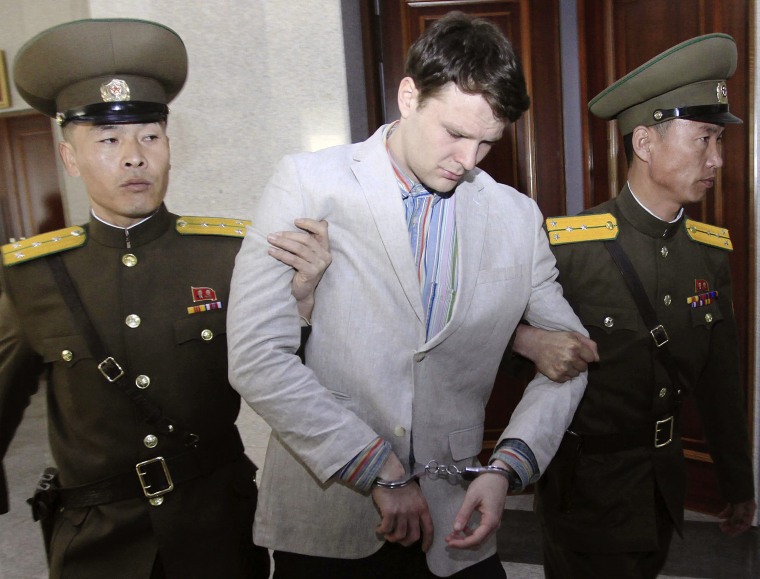Whatever caused American college student Otto Warmbier's health to erode during his imprisonment in North Korea may remain a mystery — at least for a while longer.
Warmbier's family declined to have an autopsy performed on him following his death Monday, the Hamilton County Coroner's Office in Ohio said, deciding that only an "external examination" would be performed. It was not immediately clear why the family made its decision.
"No conclusions about the cause and manner of Mr. Warmbier's death have been drawn at this time as there are additional medical records and imaging to review and people to interview," the medical examiner's office said Tuesday.
Warmbier's funeral is scheduled for Thursday at his high school alma mater in Wyoming, Ohio.
The 22-year-old had booked a travel tour of North Korea in December 2015 and was about to leave the following month for Hong Kong when he was arrested for trying to steal a propaganda banner from his hotel in the capital of Pyongyang. North Korean officials accused him of hostile acts, and after a tearful and apologetic trial, he was sentenced to 15 years of hard labor.
Related: Will Otto Warmbier’s Death Force Trump to Act on North Korea?
Warmbier's parents say he became ill after he was imprisoned, and that the North Koreans claimed that he contracted botulism and fell into a coma after taking a sleeping pill. After 17 months in custody, the North Koreans released Warmbier last week, and he was flown to the University of Cincinnati Medical Center.
Doctors there said they found no traces of active botulism, a toxin that can cause nerve injury. He remained in a state of "unresponsive wakefulness," doctors said, until his death.
"Unfortunately, the awful torturous mistreatment our son received at the hands of the North Koreans ensured that no other outcome was possible beyond the sad one we experienced today," the family said in a statement.
President Donald Trump on Tuesday told reporters that it was a "disgrace what happened to Otto," a University of Virginia undergraduate. The White House and the State Department said they were considering options in response to his death, including a travel ban on Americans visiting North Korea.
Meanwhile, Warmbier's sudden decline continues to raise questions.
Related: What Killed Otto Warmbier? Possibly a Blood Clot or Infection
Doctors in Cincinnati said he showed no signs of infection when he first arrived on American soil, and was apparently in stable condition.
Dr. Daniel Laskowitz, a professor of neurology at Duke University, told NBC News that to suddenly die after several months in a "persistent vegetative state" would be the result of either an infection or a blood clot.
"If you are in a persistent vegetative state and you are just immobile for a prolonged period of time, you have a propensity to form a clot," Laskowitz said. "That can be catastrophic and precipitous."
He added that such a long flight from North Korea to Ohio could make a blood clot even more likely to form or spread to the lungs.

